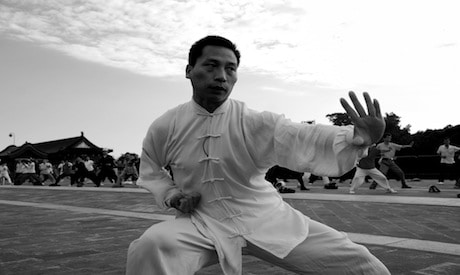
If you still make New Year’s resolutions-and even if you don’t-I suggest you consider the practice of tai chi, which is a super healthy tip to kick off 2014. This ancient Chinese practice can make you feel tremendous all over. Okay, I’ll get to the supporting scientific information in a moment, but first I just have to say that learning tai chi was one of the best decisions I ever made.
If you want to improve your balance and muscle strength, feel emotionally at peace, enjoy a different form of exercise, and experience lightness and sensuality, then tai chi is the path to take. If you have some physical limitations related to arthritis, back pain, heart disease, or other ailments or you are feeling anxious or depressed, tai chi can be the perfect fit.
What is tai chi?
Tai chi (also referred to as tai chi chu’an) was originally developed as a type of martial arts, but it has evolved into a series of gentle, focused movements that flow naturally from one to the other. The movements are done without pause so the body is constantly in motion but without stress or strain. The physical movements are teamed with deep breathing and meditation.
Read more about tai chi
This flowing motion makes those who practice tai chi look like they are performing a beautiful, sensual dance. There are several different styles of tai chi, so you can learn to “dance” in a variety of ways. In fact, even people in wheelchairs can do a form of tai chi.
Balance
The studies regarding tai chi and balance have been done in older adults, but this benefit, I have found, can be enjoyed by all ages. If you want to stick to scientific studies, a newly published 20-year review of tai chi and balance seems to provide the best proof.
In this overview, which was conducted by experts at Emory University and two Veterans Administration facilities in Georgia, the authors evaluated the results of research done over two decades. They reported that tai chi “has been found to be effective in improving balance, reducing falls and fear of falling for older adults.” Going forward, they emphasized that continuing study to uncover exactly how tai chi is beneficial “may be the most important area of discovery in this field.”
My experience: I still use the techniques I learned in tai chi classes 4 years ago to maintain good balance.
Muscle fitness
Tai chi is a low-impact exercise that can improve musculoskeletal well-being by increasing body strength, including improving flexibility of the lower back. These benefits have been shown in a number of studies, including one that reported on 209 middle- to older-aged adults who participated in a 16-week tai chi program.
By the end of the study, the participants had experienced significant improvement in both upper and lower body strength, lower back flexibility, and overall health scores. The individuals in this study practiced the most common style of tai chi, Yang style, which is widely taught throughout the United States.
My experience: As a person with lower back pain, I found tai chi was beneficial and I can still do tai chi without any back pain.
Emotional well-being
The practice of tai chi can alter your emotional landscape. A recent review of 42 trials and studies of tai chi evaluated its impact on four different psychological well-being factors. The authors found positive outcomes regarding depression, general stress management, anxiety, and exercise self-efficacy among people who had various clinical conditions.
In fact, the psychological benefits of tai chi have been studied in people with heart failure, clinical depression, and fibromyalgia, all with promising results. Researchers generally are quick to point out, however, that more in depth investigation is needed.
My experience: Whenever I want to restore a sense of calm and stillness, I can count on tai chi to bring me there. Personally I believe it is a combination of the breathing, meditation, sense of control, and the sheer fluid motion.
Heart health
Heart disease is the number one killer in the United States, and if you are free of this problem, that’s great. However, whether or not you have any form of cardiovascular disease, it’s a wise move to keep it at bay. Tai chi is a healthy practice that can help.
A recent report in Evidence Based Complementary and Alternative Medicine noted that “tai chi training has significant benefits for common cardiovascular risk factors, such as hypertension, diabetes mellitus, dyslipidemia [high cholesterol and/or triglycerides], poor exercise capacity, endothelial dysfunction, and depression.”
The reviewers went on to stress that the practice of tai chi is both safe and effective for people who have various cardiovascular conditions, including stroke, congestive heart failure, and heart attack. Naturally, if you have any type of heart condition or other health problem, you should consult your healthcare provider before starting any type of exercise.
My experience: Fortunately, nothing personally, but I did meet quite a few people in my tai chi classes who had some form of heart condition.
It does not matter if you are six or 106 (I’m somewhere in between), incorporating the practice of tai chi into your lifestyle could be among the most successful (and enjoyable) healthy tips you ever followed.
Image: Ed-meister




